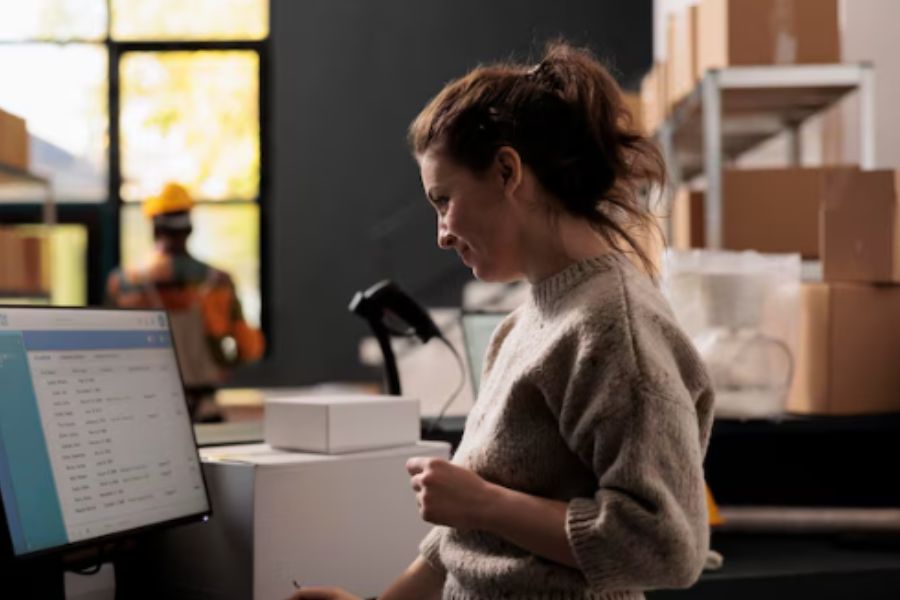The adoption of advanced technology is essential for businesses to stay competitive. One such technology that plays a pivotal role in unlocking retail success is the retail Point of Sale (POS) system. By leveraging the capabilities of a modern retail POS, businesses can streamline operations, enhance customer experiences, and drive growth. This article explores the features and benefits of retail point-of-sale systems, highlighting their significance in optimizing retail operations and driving business success.
What Is A Retail Point of Sale (POS)?
Retail Point of Sale (POS) systems serve as the cornerstone of retail operations, offering a centralized platform to facilitate transactions, manage inventory, and streamline business processes. At its core, a retail POS refers to the software and hardware combination used by retailers to conduct sales transactions at the point of purchase.
Operating at the frontline of retail establishments, a POS system acts as the primary interface between customers and retailers, enabling seamless transaction processing and efficient management of sales-related activities. Typically, a retail POS system comprises a combination of hardware components such as cash registers, barcode scanners, and receipt printers, along with software functionalities tailored to meet the specific needs of retail businesses.
The retail Point of Sale (POS) system functions by capturing and processing sales transactions in real time. When a customer makes a purchase, the POS system records the items selected, calculates the total amount due, and accepts various payment methods, including cash, credit/debit cards, or mobile payments. Once the transaction is completed, the POS system generates a receipt for the customer and updates the inventory records accordingly.
10 Features for Your Retail POS System
- Transaction processing: Efficient transaction processing is a fundamental feature of any retail POS system. It enables seamless checkout experiences for customers by swiftly processing payments through various methods such as cash, credit/debit cards, mobile payments, or digital wallets. A robust transaction processing feature ensures accuracy, security, and speed at the point of sale, enhancing customer satisfaction and reducing wait times.
- Inventory management: Inventory management functionality is essential for retailers to track and manage their product stock levels accurately. A comprehensive inventory management feature within a POS system allows retailers to monitor stock in real time, track product movement, set reorder points, and generate reports on stock levels and sales trends. This helps prevent stockouts, optimize inventory turnover, and ensure that popular items are always available to customers. Additionally, advanced inventory management features may include barcode scanning, automated stock adjustments, and integration with suppliers for seamless replenishment.
- Product information: A robust retail point of sale should offer comprehensive product information management capabilities. This includes features such as detailed product descriptions, images, pricing information, and stock levels. With easy access to product details, sales associates can provide accurate information to customers, facilitating informed purchasing decisions. Additionally, the ability to track product attributes and variations ensures efficient inventory management and helps prevent stockouts or overstock situations.
- Customer relationship management (CRM): Effective customer relationship management is essential for building loyalty and driving repeat business. A retail POS system with CRM functionality enables retailers to capture and store customer data, including contact information, purchase history, and preferences. By leveraging this data, retailers can personalize the shopping experience, send targeted promotions or rewards, and provide tailored recommendations based on past interactions. CRM features facilitate customer communication and engagement through channels such as email marketing, SMS notifications, or loyalty programs, fostering stronger relationships with shoppers and increasing brand loyalty.
- Omnichannel integration: providing a seamless shopping experience across multiple channels is essential for success. A retail POS system with omnichannel integration allows retailers to synchronize their online and offline sales channels, ensuring consistency and convenience for customers. Whether a customer makes a purchase in-store, online, or via a mobile device, the POS system updates inventory levels in real time and maintains a unified view of customer data. This integration enables retailers to offer services such as click-and-collect, buy online, return in-store (BORIS), and ship-from-store, enhancing customer satisfaction and driving sales.
- Employee management: Effective management of personnel is critical for retail operations, and a robust retail POS system streamlines employee management tasks. Features such as employee scheduling, time tracking, and performance monitoring empower retailers to optimize staffing levels, allocate resources efficiently, and ensure smooth operations. Additionally, advanced POS systems may offer features like role-based access control, allowing managers to assign specific permissions and restrict access to sensitive information. By centralizing employee management functions within the POS system, retailers can enhance productivity, minimize errors, and foster a positive work environment.
- Reporting and analytics: A powerful retail point of sale should offer a wide range of reporting capabilities, allowing retailers to track sales performance, inventory levels, and customer behavior. From sales summaries to detailed transaction histories, these reports provide valuable insights to inform strategic decision-making and drive business growth. A retail POS system equipped with advanced analytics tools enables retailers to perform in-depth analysis of key metrics such as sales trends, product performance, and customer demographics.
- Ease of use and intuitive interface: A retail POS system should feature an intuitive interface that is easy to navigate for both employees and customers. With clear, user-friendly menus and touchscreen controls, retailers can streamline transaction processing and minimize errors, resulting in a more efficient and pleasant shopping experience. Alongside an intuitive interface, comprehensive training and ongoing support are essential components of a user-friendly retail POS. By providing training resources, tutorials, and responsive customer support, POS vendors can ensure that retailers and their staff are equipped with the knowledge and assistance needed to maximize the system’s usability and effectiveness.
- Security features: Security is paramount in retail POS systems to safeguard sensitive customer information, payment data, and business operations. Key security features include encryption of payment data to prevent unauthorized access, user authentication mechanisms such as biometric verification or PIN codes, and compliance with industry standards such as PCI-DSS (Payment Card Industry Data Security Standard). Additionally, robust firewall protection, regular software updates, and intrusion detection systems help fortify the POS system against cyber threats and data breaches
- Customization and scalability: A versatile retail POS system should offer customization options to tailor the software to the unique needs of each business. Customization features may include creating personalized product catalogs, defining pricing strategies, and configuring user permissions based on roles and responsibilities within the organization. Scalability is equally important, allowing retailers to adapt and expand their POS systems as their business grows. Scalable POS solutions can accommodate increasing transaction volumes, support additional store locations, and integrate with third-party applications seamlessly
Components of Modern Retail POS
Purpose-built for Retail
The concept of purpose-built for retail refers to the tailored design and functionality of modern point-of-sale (POS) systems to meet the specific needs and requirements of retail businesses. Unlike generic POS solutions, which may offer generic features applicable across various industries, purpose-built retail POS systems are engineered with features and capabilities uniquely suited for retail environments.
These purpose-built retail POS systems are equipped with specialized tools and functionalities designed to streamline retail operations, enhance customer experiences, and drive business growth. They often include features such as inventory management, sales tracking, customer relationship management (POS CRM), and omnichannel integration, all tailored to the specific demands of retail businesses.
Purpose-built retail POS systems also prioritize ease of use and intuitive interfaces, allowing retail staff to quickly learn and navigate the system efficiently. Moreover, they offer scalability to accommodate the evolving needs of retail businesses, whether it’s expanding to multiple locations, integrating with new technologies, or adapting to changing consumer preferences.
Intuitive Touch Screen UI
One of the hallmark features of modern retail POS systems is an intuitive touchscreen user interface (UI) that enhances usability and efficiency in day-to-day operations. Unlike traditional POS systems with complex interfaces and clunky hardware, modern POS solutions prioritize user experience by incorporating sleek touchscreen displays that mimic the familiarity of smartphones and tablets.
The intuitive touchscreen UI simplifies navigation and streamlines transaction processes, enabling sales associates to serve customers swiftly and accurately. With user-friendly icons, intuitive menu layouts, and responsive touch controls, employees can perform tasks such as product lookup, inventory management, and checkout procedures with minimal training, reducing the learning curve for new staff members.
The touch screen UI facilitates quick access to essential functions and information, empowering sales associates to provide personalized assistance to customers on the sales floor. Whether searching for product details, checking stock availability, or processing transactions, the intuitive interface fosters seamless interactions between staff and shoppers, leading to enhanced customer satisfaction and loyalty.
Enhancing Customer Interactions
Modern retail point of sale features intuitive user interfaces designed to streamline the checkout process and provide a seamless experience for both customers and sales associates. Intuitive touch-screen displays, easy navigation, and clear prompts enable swift transaction processing, reducing wait times and enhancing overall satisfaction.
Retail POS system typically includes an integrated customer database that stores valuable information such as purchase history, preferences, and contact details. By accessing this database during transactions, sales associates can personalize interactions, recommend relevant products, and offer tailored promotions based on the customer’s buying behavior.
A modern retail POS system provides real-time inventory visibility, allowing sales associates to check product availability across all store locations and fulfillment channels. By ensuring that customers can quickly locate and purchase the items they desire, retailers can minimize stockouts, reduce wait times, and enhance the overall shopping experience.
Omnichannel Approach
A modern retail POS system integrates with various sales channels, including brick-and-mortar stores, e-commerce platforms, mobile apps, and social media channels. This integration ensures that inventory, customer data, and transactions are synchronized across all channels, providing a unified view of the business.
ConnectPOS, a leading omnichannel POS solution, exemplifies this approach by offering a range of features designed to enhance customer engagement and streamline operations across multiple touchpoints. Product availability is updated in real-time across all channels, minimizing the risk of stockouts and overselling.
ConnectPOS can capture customer data and preferences, enabling retailers to deliver personalized shopping experiences. By analyzing purchase history and interaction data, ConnectPOS helps retailers tailor product recommendations, promotions, and marketing campaigns to individual customer preferences, fostering loyalty and repeat business.
Why Does Modern Retail Point of Sale (POS) Contribute to Retail Success?
Modern retail Point of Sale (POS) systems play a pivotal role in driving retail success by offering advanced features and capabilities that streamline operations, enhance customer experiences, and drive growth. ConnectPOS, as a leading omnichannel POS solution, exemplifies how modern POS technology contributes to retail success.
Omnichannel Integration: ConnectPOS seamlessly integrates online and offline sales channels, enabling retailers to offer a unified shopping experience to customers across multiple touchpoints. By synchronizing inventory, customer data, and sales transactions in real-time, ConnectPOS empowers retailers to deliver consistent and personalized experiences, whether customers shop in-store, online, or via mobile devices.
Enhanced Customer Interactions: ConnectPOS facilitates personalized interactions with customers by providing access to comprehensive customer profiles, purchase histories, and preferences. Armed with this information, retailers can deliver targeted promotions, recommend relevant products, and provide tailored assistance, fostering stronger customer relationships and driving repeat business.
Efficient Operations: With intuitive features such as barcode scanning, inventory management, and order fulfillment capabilities, ConnectPOS streamlines day-to-day operations and optimizes workflow efficiency. By automating routine tasks and reducing manual errors, ConnectPOS enables retailers to focus more time and resources on strategic initiatives and business growth.
Data-Driven Insights: ConnectPOS offers robust reporting and analytics tools that provide valuable insights into sales performance, inventory levels, and customer behavior. By leveraging actionable data, retailers can make informed decisions, identify trends, and optimize pricing, promotions, and product assortments to maximize profitability and drive business success.
Scalability and Flexibility: ConnectPOS is designed to scale alongside growing retail businesses, offering flexibility to adapt to changing needs and requirements. Whether opening new store locations, expanding product offerings, or integrating with third-party applications, ConnectPOS provides the agility and scalability retailers need to stay competitive and fuel long-term growth.
FAQs (Frequently Asked Questions) – Unlocking Retail Success: Retail Point of Sale Features and Benefits
How Does Retail POS Contribute to Customer Experience?
Retail POS systems contribute to the customer experience by streamlining transactions, reducing checkout times, and enabling personalized interactions. With features like integrated customer databases and purchase history tracking, retailers can provide tailored recommendations, loyalty rewards, and efficient order processing, enhancing overall satisfaction and loyalty.
What Are the Key Components of a Modern Retail POS System?
Key components of a modern retail POS include transaction processing capabilities, inventory management tools, customer relationship management (CRM) features, omnichannel integration, reporting and analytics functionalities, employee management tools, security features, customization options, and scalability for future growth.
How Does Retail POS Aid in Omnichannel Retailing?
Retail POS systems aid in omnichannel retailing by integrating online and offline sales channels, synchronizing inventory across multiple locations, and providing a seamless shopping experience across various touchpoints. This enables customers to shop anytime, anywhere, and choose their preferred fulfillment options, whether in-store pickup, home delivery, or ship-from-store.
How Does a Retail POS System Contribute to Data-Driven Decision Making?
Retail POS systems contribute to data-driven decision-making by capturing and analyzing critical sales data, inventory levels, customer preferences, and market trends. With comprehensive reporting and analytics tools, retailers can gain valuable insights into their business performance, identify growth opportunities, optimize pricing strategies, and make informed decisions to drive profitability.
Is Security a Concern with A Retail Point of Sale?
Given the sensitive nature of customer payment data and personal information, security is a top priority for retail POS systems. Modern POS solutions employ robust security measures such as encryption, tokenization, EMV compliance, and PCI DSS (Payment Card Industry Data Security Standard) compliance to safeguard against data breaches and unauthorized access. Additionally, regular software updates and security patches help mitigate evolving cybersecurity threats and ensure the protection of sensitive information.
Conclusion
The retail point-of-sale system serves as a cornerstone for unlocking retail success in today’s dynamic market. By embracing the features and benefits offered by modern POS solutions, businesses can streamline operations, enhance customer experiences, and drive growth. Contact us for more information.



